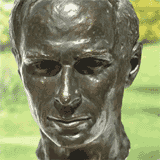
Max Nicholson

Max Nicholson
Max Nicholson Establishment Revolutionary?
John Elkington celebrates the life and works of a key architect of the ‘Environmental Revolution’.
Call me a ghoul, but every morning the first thing I read is the Obituaries page of The Times. I adore the life stories of extraordinary people and of ordinary people caught up in extraordinary circumstances. Over the years, my eye – consciously or unconsciously – has been uneasily scanning for something that ultimately appeared on 30 April: the obituary of Max Nicholson, who died on 26 April, aged 98. It still came as a shock.
Like Mount Rushmore, Max seemed like one of those semi-eternal features in the landscape. With its towering carvings of Washington, Jefferson, Lincoln and Roosevelt, Rushmore looks age-old but was carved between 1927 and 1941. And it is an extraordinary reflection of Max’s longevity that when the carving started he was already in his early twenties. Born in 1904, he published his first book, Birds In England, in 1926.
Obituary-spotting, it turns out, is like waiting for buses: you sit for ages, then three arrive together. The day after Max’s obituary, one appeared for Guy Mountfort, another co-founder of the World Wildlife Fund (WWF). Then, on 16 May, along came the obituary of Prince Sadruddin Aga Khan, also devoted to environmental causes. Even among such giants, however, Max stood out.
For one thing, he founded organisations left, right and centre. Perhaps the first, in 1932, was the British Trust for Ornithology (BTO), but the litany goes on and on, including Common Ground International, the Conservation Corps (later the British Trust for Conservation Volunteers), IUCN (now the World Conservation Union) and WWF. When travelling with him five decades later, I was constantly amazed at his knowledge of birdlife. I shouldn’t have been: apart from anything else, between 1977 and 1994 he produced nine volumes of Birds of the Western Palaearctic.
You couldn’t help noticing his limp, a result of polio contracted in 1952 as leader of a UN survey team in Baluchistan. But his energy seemed to have geological sources. In fact, when I visited Max late in 2002, I left hopeful that he would make his centenary. There would have been much to celebrate and reflect upon.
I first met him in 1978, when he asked me to help him and David Layton found Environmental Data Services (ENDS). Having spent much of his life working with the natural world, whether as director-general of the Nature Conservancy (1952-1966) or working with Prince Phillip on the ‘Countryside in 1970’ conferences, Max had decided that the next big challenge was to drive environmental thinking into the world of business, which he described as "the last remaining dark continent".
As his colleague Bob Boote has noted, much of Max’s thinking and writings "eerily prefigure" today’s debate about sustainable development. So, for example, he chaired the processes resulting in the UK response to 1980s World Conservation Strategy, where I was responsible for the industry report.
Some of our liveliest disagreements were about groups like Friends of the Earth and Greenpeace, which for years he saw as non-scientific interlopers. But one great thing about living to a ripe old age is that you have time to change your mind gracefully.
I recall the extraordinary story of Max’s work with the civil service, which he joined in 1940. He led the allocation of tonnage division at the Ministry of War Transport, when U-boats were threatening to strangle Britain’s lifelines. He said his ecology background was vital in handling the complexities of the Pool of London, involving juggling the timing of the tides, the docking of convoys and the arrival overhead of Luftwaffe bombers.
Max attended the great wartime summits, including Cairo, Quebec, Yalta and Potsdam. Later, he chaired the committee for the 1951 Festival of Britain. He seemed part of the Establishment, despite his no-holds-barred attacks on the civil service in The System (1967) and unsustainable development in The Environmental Revolution (1970), but was a consummate insider-outsider.
If I were carving his headstone, I might let his head (shaped like that of a bald eagle) speak for itself. If words were required, I would leave it at ‘Environmental Revolutionary, 1904-2003’.
A memorial website is at www.maxnicholson.com